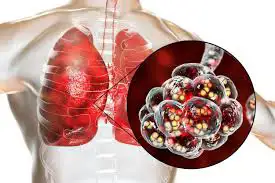

Çfarë është infeksioni pneumokokal?
Ky është një grup sëmundjesh të shkaktuara nga një bakter i quajtur pneumokok. Infeksioni pneumokoku shkakton sëmundje të veshëve (otitis), mushkërive (pneumoni), gjakut (bakteremi, sepsë) dhe trurit (meningjiti). Pavarësisht se në shumicën e pacientëve infeksioni kalon pa komplikime, në disa raste janë të mundshme komplikime serioze, paaftësi të përjetshme dhe madje edhe vdekje. Fëmijët nën 2 vjeç dhe grupet e rrezikut mjekësor janë veçanërisht të prekshëm ndaj këtij infeksioni.
Është infeksioni pneumokokal ai që është një nga shkaqet më të shpeshta të komplikimeve bakteriale të infeksioneve virale tek fëmijët nën 2 vjeç - otitis, pneumoni, meningjiti. Trajtimi me penicilinë dhe antibiotikë të tjerë aktualisht nuk është aq efektiv sa më parë, sepse disa shtame të pneumokokut kanë zhvilluar rezistencë ndaj antibiotikëve. Kjo e bën edhe më urgjente parandalimin e sëmundjeve nëpërmjet vaksinimit.
Cilat janë simptomat e sëmundjes?
Infeksioni pneumokoku shkakton një grup të tërë sëmundjesh, kështu që simptomat varen nga cili organ është prekur.
Pneumonia pneumokokale (inflamacion i mushkërive) shkakton:
Meningjiti pneumokokal (një infeksion i meningjeve) shkakton:
Infeksioni pneumokoku shkakton deri në 50% të otitit media (infeksionet e veshit). Simptomat e kësaj sëmundjeje: dhimbje në vesh; skuqje dhe inflamacion i daulles së veshit; ndonjëherë ethe ose përgjumje.
Bakteremia pneumokokale dhe sepsa pneumokokale (infeksionet e gjakut) shkaktojnë ethe, të dridhura dhe reduktim të përgjigjes ndaj stimujve të jashtëm.
Sa të rrezikshme janë këto sëmundje?
Ecuria e sëmundjes mund të ndryshojë nga e lehtë në shumë e rëndë. Për shembull, sipas të dhënave nga Qendrat për Kontrollin dhe Parandalimin e Sëmundjeve, SHBA, rreth 2000 raste të sëmundjeve të rënda (bakteremia, pneumonia me bakteremi dhe meningjiti) te fëmijët nën 5 vjeç regjistrohen çdo vit në SHBA. Këto sëmundje mund të çojnë në paaftësi të përjetshme: shurdhim, dëmtim të trurit, humbje të gjymtyrëve. 1 në 12 fëmijë që sëmuren nga meningjiti pneumokokal vdes.
Si mund të infektoheni?
Infeksioni pneumokoksik përhapet përmes ajrit: kur një person i infektuar kollitet, teshtin ose madje flet me ju nga një distancë e afërt. Në fund të fundit, ndonjëherë njerëzit e infektuar nuk kanë simptoma, por janë bartës të baktereve që mund të jenë në zgavrën e hundës ose orofaringut. Individë të tillë gjithashtu mund të përhapin infeksionin dhe të infektojnë të tjerët.
Si të mbroheni nga infeksioni pneumokok?
Për shkak të përhapjes së rezistencës ndaj antibiotikëve (situatat kur trajtimi me antibiotikë humbet efektivitetin, sepse për shkak të përdorimit të tepërt të tyre, mikroorganizmat bëhen të pandjeshëm ndaj tyre), parandalimi i infeksionit pneumokokal me vaksinim bëhet edhe më urgjent.
Në Ukrainë janë regjistruar 2 vaksina kundër infeksionit pneumokokal - Synflorix dhe Prevenar 13. Të dyja mund të përdoren nga mosha 6 javëshe. Synflorix përdoret për fëmijët nën 5 vjeç, Prevenar 13 - për të gjitha kategoritë e moshave. Skema e vaksinimit varet nga mosha kur është nisur. Vaksina kundër pneumokokut është një nga ato të rekomanduara dhe mund të blihet në një farmaci me shpenzimet e pacientit dhe të administrohet në një institucion mjekësor komunal ku ai shërbehet, ose në një klinikë private. Meqenëse këto vaksina nuk përfshihen në kalendarin kombëtar të vaksinimit të Ukrainës, oraret e administrimit të tyre përcaktohen nga udhëzimet për këto barna. (Shënim: Në shumë vende, këto vaksina përfshihen në kalendarin kombëtar dhe oraret e vaksinimit të këtyre vendeve mund të ndryshojnë. Nëse jeni në një vend tjetër, ndiqni rekomandimet kombëtare të atij vendi.)
Skemat e vaksinimit kundër infeksionit pneumokokal me vaksina të regjistruara në Ukrainë:
| Emri i vaksinës | Nga çfarë infeksioni mbron? | Skema e vaksinimit |
| Synflorix | Infeksion pneumokoku (10 shtame + bacil atipik Haemophilus) | Foshnjat e moshës 6 javë deri në 6 muaj : 4 doza (3 doza me një interval prej të paktën 1 muaj + 4, përforcues, doza jo më herët se 6 muaj pas dozës së 3-të, mundësisht midis 12 dhe 15 muajsh) OSE 3 doza ( në këtë rast, doza e parë administrohet duke filluar nga mosha 2 muajsh, doza e dytë - pas 2 muajsh, dhe doza e tretë rekomandohet përforcuese. jo më herët se 6 muaj pas datës 2).
Foshnjat e moshës 7-11 muajsh : tre doza (2 doza me një interval prej të paktën 1 muaji ndërmjet dozave; doza e tretë rekomandohet në vitin e dytë të jetës me një interval prej të paktën 2 muajsh nga doza e mëparshme). Fëmijët e moshës 12 muaj - 5 vjeç : dy doza me një interval prej të paktën 2 muajsh. |
| Prevenar 13 | Infeksion pneumokoku (13 shtame) | Foshnjat e moshës 6 javë deri në 6 muaj : katër doza (intervali midis tre dozave të para është të paktën 1 muaj; doza e katërt (rivaksinimi) rekomandohet në moshën 11-15 muajsh) OSE
tri doza (në këtë rast, doza e parë mund të administrohet duke filluar nga mosha 2 muajsh, e dyta - pas 2 muajsh. Doza e tretë (rivaksinimi) rekomandohet të administrohet në moshën 11-15 muajsh). Foshnjat e moshës 7-11 muajsh : tre doza me një interval midis administrimit të paktën 1 muaj (doza e tretë rekomandohet të administrohet në vitin e dytë të jetës). Fëmijët e moshës 12-23 muaj : dy doza me një interval prej të paktën 2 muajsh. Fëmijët mbi 2 vjeç dhe të rriturit: një dozë . Nevoja për rivaksinim me dozën tjetër të vaksinës Prevenar® 13 nuk është vërtetuar . |
Kush ka nevojë kryesisht për vaksinimin kundër infeksionit pneumokokal?
Për fëmijët deri në 2 vjeç, personat nga grupet e rrezikut mjekësor, të moshuarit.
